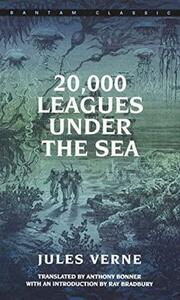You need to sign in or sign up before continuing.
Take a photo of a barcode or cover
adventurous
informative
inspiring
lighthearted
mysterious
medium-paced
Plot or Character Driven:
Plot
Strong character development:
No
Diverse cast of characters:
No
Flaws of characters a main focus:
Complicated
adventurous
informative
inspiring
medium-paced
I have mixed feelings about the book.
I enjoyed the story and most of the characters. I reread the story specifically to get a bead on Nemo's character development. I found Aronnax to be a cipher and Conseil and Land to be more or less caricatures. Only Nemo had a character with any complexity, which I thought was an interesting choice by Verne. Even so, it seemed like a trite sort of complexity. Perhaps it's a cliché now as a result of this book? I also thought it was curious that he chose to make Land a Canadian. Probably just so the character could be fluent in French--Land seems more like a stereotypical American, going so far as to whistle "Yankee Doodle." I don't know how similar Canadians were to Americans in the mid-19th century, but I'd wager money that this tune was not in their repertoire. In any case, this is primarily an adventure story so it is excusable to have characters that are archetypes or one dimensional.
Verne points out that a lot of marine mammal species are nearing extinction (in the mid 19th) due to human predation, but portrays fish and mollusc species as nothing less than superabundant. I'd think he would have recognized that these animals might not be far behind. Some cognitive dissonance here, simultaneously applauding him for recognizing that people are doing terrible damage to whales while shaking my head at the statement that people couldn't make a dent in the oyster populations. You'd think that a downer like Nemo would prophesy gloom and doom even if no evidence could yet be seen.
Most of the complaints about this book are about the fact that it seems to be largely a science lesson. I agree that the numerous long lists of marine biota get tiresome, but when read aloud, they do have some poetry about them. Also, a lot of the taxonomy and biology is outdated--although at least more rooted in reality than some of Nemo's feats of engineering--so I cringe at the idea of people taking this book as a legitimate lesson in marine biology.
I enjoyed the story and most of the characters. I reread the story specifically to get a bead on Nemo's character development. I found Aronnax to be a cipher and Conseil and Land to be more or less caricatures. Only Nemo had a character with any complexity, which I thought was an interesting choice by Verne. Even so, it seemed like a trite sort of complexity. Perhaps it's a cliché now as a result of this book? I also thought it was curious that he chose to make Land a Canadian. Probably just so the character could be fluent in French--Land seems more like a stereotypical American, going so far as to whistle "Yankee Doodle." I don't know how similar Canadians were to Americans in the mid-19th century, but I'd wager money that this tune was not in their repertoire. In any case, this is primarily an adventure story so it is excusable to have characters that are archetypes or one dimensional.
Verne points out that a lot of marine mammal species are nearing extinction (in the mid 19th) due to human predation, but portrays fish and mollusc species as nothing less than superabundant. I'd think he would have recognized that these animals might not be far behind. Some cognitive dissonance here, simultaneously applauding him for recognizing that people are doing terrible damage to whales while shaking my head at the statement that people couldn't make a dent in the oyster populations. You'd think that a downer like Nemo would prophesy gloom and doom even if no evidence could yet be seen.
Most of the complaints about this book are about the fact that it seems to be largely a science lesson. I agree that the numerous long lists of marine biota get tiresome, but when read aloud, they do have some poetry about them. Also, a lot of the taxonomy and biology is outdated--although at least more rooted in reality than some of Nemo's feats of engineering--so I cringe at the idea of people taking this book as a legitimate lesson in marine biology.
informative
slow-paced
adventurous
fast-paced
Plot or Character Driven:
Character
Strong character development:
No
Loveable characters:
Yes
Diverse cast of characters:
No
Flaws of characters a main focus:
No
Was a bit disappointed that I didn't like this more! The ideas were very cool, but the sense of adventure was dampened by how much the events meandered from one thing to another. Several things that I found most interesting (Captain Nemo's past, battles with sea monsters, etc) were glazed over in favor of lists of species and long descriptions of events unrelated to the actual plot.
Still a lot of inspiration in here for adventure/exploration stories, though!
Still a lot of inspiration in here for adventure/exploration stories, though!
adventurous
informative
mysterious
slow-paced
Plot or Character Driven:
Plot
Strong character development:
No
Diverse cast of characters:
No
Flaws of characters a main focus:
No
adventurous
lighthearted
mysterious
medium-paced
Plot or Character Driven:
Plot
Strong character development:
No
Loveable characters:
No
Diverse cast of characters:
No
Flaws of characters a main focus:
Yes
adventurous
inspiring
medium-paced
Plot or Character Driven:
Plot
Strong character development:
No
Loveable characters:
Yes
Diverse cast of characters:
N/A
It was engaging for me largely due to its in novelty in that it's the first fictional story I've read that takes place almost entirely in a submarine setting.
The challenging (and somewhat tedious parts of the story) were where Verne describes sealife in detail using their scientific names which I and most readers who are not marine biologists have to Google if you want to know what he's referring to. He also describes, in detail, locations the Nautilus visits using latitude, longitude and names of far away places. Again, most readers do not understand the geocoordinate system and might find this aspect of the book tedious and most readers likewise will not understand the islands he refers to as even in college level geography class we skip over these tiny land masses. So the book has a lot of content that would be best enjoyed by someone who is geographically inclined, as such I'd definitely recommend it to someone like a cruise ship captain who happens to have minored in marine biology. For the layman however I feel as though this book would have benefited tremendously from some simple maps and illustrations of the places and sealife they encounter. I am not sure if the original was illustrated but the digital version I read certainly was not, and thus if you do want greater immersion instead of just skimming over details you have to research as you're following the story.
The narrative itself for me was okay, and the ending (without giving it away) I enjoyed esp its open-endedness. The story explores concepts like revenge, liberty, innovation, homesickness and friendship though is not spectacularly specific about either nor do I feel like it teaches some great moral lessons although misanthropists such as myself can certainly identify and relate to Captain Nemo's determined isolationism. I also enjoyed the main character's internal conflict with how he both greatly admires yet also fears and somewhat resents Captain Nemo.
All in all if you are a frequent reader, enjoy adventure books and escapism through reading, have misanthropic tendencies and have not yet read a submarine story I would recommend the book. I didn't give it five stars because to me it is not absolutely fantastic, though it is still good and worth reading to the right person.
The challenging (and somewhat tedious parts of the story) were where Verne describes sealife in detail using their scientific names which I and most readers who are not marine biologists have to Google if you want to know what he's referring to. He also describes, in detail, locations the Nautilus visits using latitude, longitude and names of far away places. Again, most readers do not understand the geocoordinate system and might find this aspect of the book tedious and most readers likewise will not understand the islands he refers to as even in college level geography class we skip over these tiny land masses. So the book has a lot of content that would be best enjoyed by someone who is geographically inclined, as such I'd definitely recommend it to someone like a cruise ship captain who happens to have minored in marine biology. For the layman however I feel as though this book would have benefited tremendously from some simple maps and illustrations of the places and sealife they encounter. I am not sure if the original was illustrated but the digital version I read certainly was not, and thus if you do want greater immersion instead of just skimming over details you have to research as you're following the story.
The narrative itself for me was okay, and the ending (without giving it away) I enjoyed esp its open-endedness. The story explores concepts like revenge, liberty, innovation, homesickness and friendship though is not spectacularly specific about either nor do I feel like it teaches some great moral lessons although misanthropists such as myself can certainly identify and relate to Captain Nemo's determined isolationism. I also enjoyed the main character's internal conflict with how he both greatly admires yet also fears and somewhat resents Captain Nemo.
All in all if you are a frequent reader, enjoy adventure books and escapism through reading, have misanthropic tendencies and have not yet read a submarine story I would recommend the book. I didn't give it five stars because to me it is not absolutely fantastic, though it is still good and worth reading to the right person.




